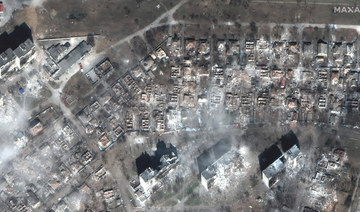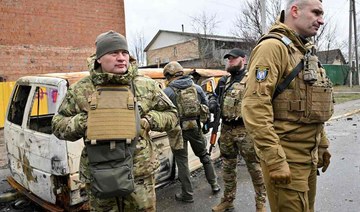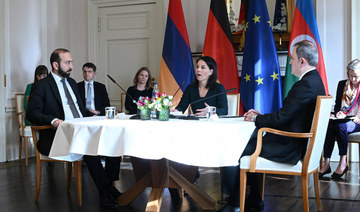KYIV: Russia vowed to continue its bloody offensive in Ukraine as the war neared its seventh week Wednesday, as President Vladimir Putin insisted the campaign was going as planned despite a major withdrawal and significant losses.
Thwarted in their push toward the capital, Kyiv, Russian troops focused on the eastern region of Donbas, where Ukraine said it was investigating a claim that a poisonous substance had been dropped on its troops. It was not clear what the substance might be, but Western officials warned that any use of chemical weapons by Russia would be a serious escalation of the already devastating war.
Russia invaded on Feb. 24 with the goal, according to Western officials, of taking Kyiv, toppling the government and installing a Moscow-friendly regime. In the six weeks since, the ground advance stalled and Russian forces lost potentially thousands of fighters and were accused of killing civilians and other atrocities.
Putin said Tuesday that Moscow “had no other choice” and that the invasion aimed to protect people in parts of eastern Ukraine and to “ensure Russia’s own security.” He vowed it would “continue until its full completion and the fulfillment of the tasks that have been set.”
Meanwhile Wednesday, Ukrainian President Volodymyr Zelensky was expected to receive the presidents of Poland, Lithuania, Latvia and Estonia — his staunch European allies.
“We are visiting Ukraine to show strong support for the Ukrainian people, will meet dear friend President Zelensky,” Estonian President Alar Karis tweeted.
For now, Putin’s forces are gearing up for a major offensive in the Donbas, where Russian-allied separatists and Ukrainian forces have been fighting since 2014, and where Russia has recognized the separatists’ claims of independence. Military strategists say Moscow believes local support, logistics and the terrain in the region favor its larger, better-armed military, potentially allowing Russia to finally turn the tide in its favor.
In Mariupol, a strategic port city in the Donbas, a Ukrainian regiment defending a steel mill alleged that a drone dropped a poisonous substance on the city. The assertion by the Azov Regiment, a far-right group now part of the Ukrainian military, could not be independently verified. The regiment indicated there were no serious injuries.
Zelensky said that while experts try to determine what the substance might be, “The world must react now.”
The claims came after a Russia-allied separatist official appeared to urge the use of chemical weapons, telling Russian state TV on Monday that separatist forces should seize the plant by first blocking all the exits. “And then we’ll use chemical troops to smoke them out of there,” the official, Eduard Basurin, said. He denied Tuesday that separatist forces had used chemical weapons in Mariupol.
Ukrainian Deputy Defense Minister Hanna Maliar said officials were investigating, and it was possible phosphorus munitions — which cause horrendous burns but are not classed as chemical weapons — had been used in Mariupol, which has been pummeled by weeks of Russian assaults.
Western leaders warned that if chemical weapons are found to have been used, it would amount to a grievous breach of international law.
President Joe Biden for the first time referred to Russia’s invasion as a “genocide” and said “Putin is just trying to wipe out the idea of even being a Ukrainian.”
The Pentagon said it could not confirm the drone report but reiterated US concerns about Russia using chemical agents. Britain, meanwhile, has warned that Russia may resort to phosphorus bombs, which are banned in civilian areas under international law, in Mariupol.
Most armies use phosphorus munitions to illuminate targets or to produce smoke screens. Deliberately firing them into an enclosed space to expose people to fumes could breach the Chemical Weapons Convention, said Marc-Michael Blum, a former laboratory head at the Netherlands-based Organization for the Prohibition of Chemical Weapons.
“Once you start using the properties of white phosphorus, toxic properties, specifically and deliberately, then it becomes banned,” he said.
In Washington, a senior US defense official said the Biden administration was preparing another package of military aid for Ukraine to be announced in the coming days, possibly totaling $750 million. The official spoke on condition of anonymity to discuss plans not yet publicly announced. Delivery is due to be completed this week of $800 million in military assistance approved by Biden a month ago.
In the face of stiff resistance by Ukrainian forces bolstered by Western weapons, Russian forces have increasingly relied on bombarding cities, flattening many urban areas and killing thousands. The war has driven more than 10 million Ukrainians from their homes — including nearly two-thirds of the country’s children.
Ukraine’s Deputy Prime Minister Iryna Vereshchuk said humanitarian corridors used to get people out of cities under Russian attack will not operate on Wednesday because of poor security.
She said that in the southeast Zaporizhzhia region, Russian troops blocked evacuation buses, and in the Luhansk region, they were violating the cease-fire. “The occupiers not only disregard the norms of international humanitarian law, but also cannot properly control their people on the ground. All this creates such a level of danger on the routes that we are forced to refrain from opening humanitarian corridors today.”
Moscow’s retreat from cities and towns around Kyiv led to the discovery of large numbers of apparently massacred civilians, prompting widespread condemnation and accusations of war crimes.
Zelensky said evidence of “inhuman cruelty” toward women and children in Bucha and other suburbs of Kyiv continued to surface, including alleged rapes.
“Not all serial rapists reach the cruelty of Russian soldiers,” Zelensky said.
More than 720 people were killed in Kyiv suburbs that had been occupied by Russian troops and over 200 were considered missing, the Interior Ministry said early Wednesday.
In Bucha alone, Mayor Anatoliy Fedoruk said 403 bodies had been found and the toll could rise as minesweepers comb the area.
In the Chernihiv region, villagers said more than 300 people had been trapped for almost a month by the occupying Russian troops in the basement of a school and only allowed outside to go to the toilet or cook on open fires.
Valentyna Saroyan told The Associated Press she saw at least five people die in Yahidne, 140 kilometers (86 miles) north of Kyiv. In one of the rooms, the residents wrote the names of those who perished during the ordeal — the list counted 18 people.
Villagers say they don’t know the cause of the deaths. Russian soldiers allowed them to remove the bodies from time to time in order to bury them in a mass grave at the local cemetery.
Julia Surypak said the Russians only allowed some people to make a short trip home if they sang the Russian anthem. Another resident, Svitlana Baguta, said a Russian soldier made her drink from a flask pointing a gun at her face.
Ukraine’s prosecutor-general’s office said Tuesday it was also looking into events in the Brovary district, which lies to the northeast. It said the bodies of six civilians were found with gunshot wounds in a basement in the village of Shevchenkove and Russian forces were believed to be responsible.
Prosecutors are also investigating allegations that Russian forces fired on a convoy of civilians trying to leave by car from the village of Peremoha in the Brovary district, killing four people including a 13-year-old boy. In another attack near Bucha, five people were killed including two children when a car was fired upon, prosecutors said.
Putin falsely claimed Tuesday that Ukraine’s accusation that hundreds of civilians were killed by Russian troops in the town of Bucha were “fake.” Associated Press journalists saw dozens of bodies in and around the town, some of whom had their hands bound and appeared to have been shot at close range.
Putin vows war will continue as Russian troops mount in east
https://arab.news/z5pbq
Putin vows war will continue as Russian troops mount in east
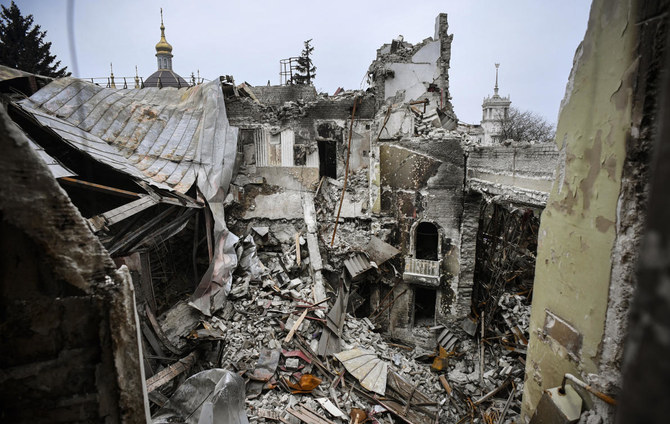
- Russia invaded on Feb. 24 with the goal, according to Western officials, of taking Kyiv, toppling the government and installing a Moscow-friendly regime
- For now, Putin’s forces are gearing up for a major offensive in the Donbas, where Russian-allied separatists and Ukrainian forces have been fighting since 2014
Russia’s biggest airstrike in weeks piles pressure on Ukraine power grid
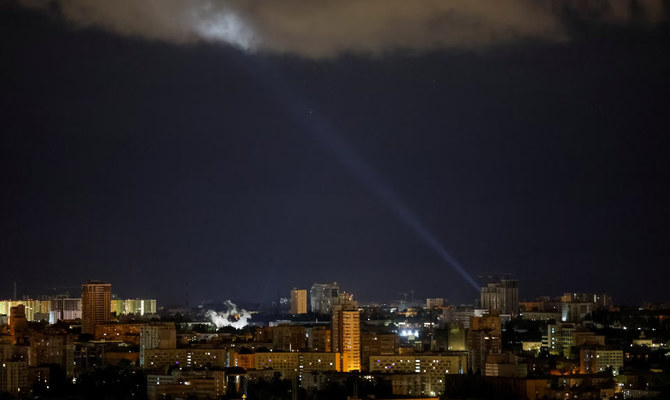
- Russia’s defense ministry said it struck Ukraine’s military-industrial complex and energy facilities in retaliation for Kyiv’s strikes on Russian energy facilities
KYIV: Russian missiles and drones struck nearly a dozen Ukrainian energy infrastructure facilities on Wednesday, causing serious damage at three Soviet-era thermal power plants and blackouts in multiple regions, officials said.
Ukraine’s air force said it shot down 39 of 55 missiles and 20 of 21 attack drones used for the attack, which piles more pressure on the energy system more than two years after Russia launched its full-scale invasion.
“Another massive attack on our energy industry!” Energy Minister German Galushchenko wrote on the Telegram app.
Two people were injured in the Kyiv region and one was hurt in the Kirovohrad region, Interior Minister Ihor Klymenko said.
Galushchenko said power generation and transmission facilities in the Poltava, Kirovohrad, Zaporizhzhia, Lviv, Ivano-Frankivsk and Vinnytsia regions were targeted.
Some 350 rescuers raced to minimize the damage to energy facilities, 30 homes, public transport vehicles, cars, and a fire station, the interior ministry said.
National power grid operator Ukrenergo said it was forced to introduce electricity cuts in nine regions for consumers and that it would expand them nationwide for businesses during peak evening hours until 11 p.m. (2000 GMT).
Ukrenergo CEO Volodymyr Kudrytskyi, interviewed by the Ukrainska Pravda media outlet, said electricity imports would not make up for power shortages. He said hydropower stations had also been hit, clarifying an earlier company statement omitting hydro stations from the list of affected facilities.
Power cuts for industrial users, he said, were “almost guaranteed” but interruptions for domestic users would depend on how well they reduced consumption.
“Many important power stations were damaged,” he said, citing three stations operated by DTEK, Ukraine’s biggest private company, as well as two hydropower stations.
“The damage is on quite a large scale. There is a significant loss of generating power, so significant that even imports of power from Europe will not cover the shortage that has been created in the energy system.”
Russia’s defense ministry said it struck Ukraine’s military-industrial complex and energy facilities in retaliation for Kyiv’s strikes on Russian energy facilities.
“As a result of the strike, Ukraine’s capabilities for the output of military products, as well as the transfer of Western weapons and military equipment to the line of contact, have been significantly reduced,” the ministry said.
WORLD WAR TWO ANNIVERSARY
President Volodymyr Zelensky noted the attacks were launched on the day Ukraine marks the end of World War Two.
“This is how the Kremlin marks the end of World War Two in Europe, with a massive strike, attempting to disrupt the lives of our people with its Nazism,” he said in his nightly video address.
In an earlier online address, Zelensky singled out what he said was the West’s limited progress in curbing Russian energy revenue and some countries that attended President Vladimir Putin’s inauguration for a fifth term in the Kremlin on Tuesday.
Fighting Nazism back then, he said, was “when humanity unites, opposes Hitler, instead of buying his oil and coming to his inauguration.”
Ukraine has stepped up drone attacks on Russian refineries this year despite apparent objections by the United States, trying to find a pressure point against the Kremlin whose forces are slowly advancing in the eastern Donbas region.
Ukrainian strikes on Russian refineries may have disrupted more than 15 percent of Russian oil refining capacity, a NATO military alliance official has said.
After pounding the energy system in the first winter of the war, Russia renewed its assault on the grid in March as Ukraine was running low on stocks of Western air defense missiles.
Prime Minister Denys Shmyhal estimated that more than 800 heating facilities had been damaged and up to 8 GW of power generation lost so far, adding the government needed $1 billion to fund repair work.
DTEK vowed to keep working to restore power at its facilities, and its CEO, Maxim Timchenko, called on Ukraine’s allies to provide more air defense systems.
Officials did not name the facilities hit on Wednesday, part of a policy of wartime secrecy that Kyiv says is needed to prevent Russia using the information for further strikes.
But Lviv governor Maksym Kozytskyi said Russia attacked a natural gas storage facility in his region in the west of the country, Radio Free Europe/Radio Liberty reported.
In central Poltava region, energy infrastructure was hit by a drone, Poltava Regional Governor Filip Pronin said.
The governors of Vinnytsia and Zaporizhzhia said critical civilian infrastructure facilities were damaged.
Armenia’s prime minister in Russia for talks amid strain in ties
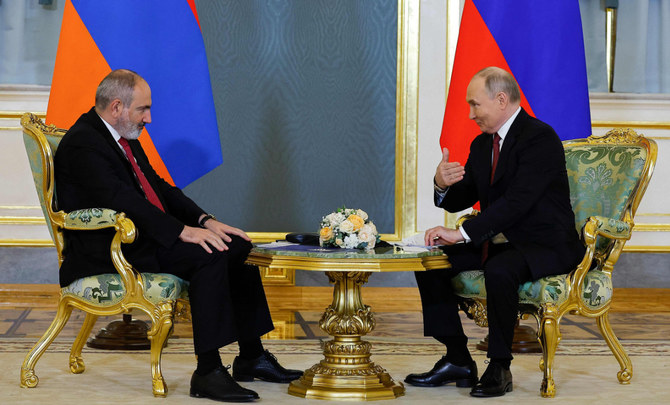
- Putin hosted Nikol Pashinyan for talks following a summit of the Eurasian Economic Union, a Moscow-dominated economic alliance
- Armenia’s ties with its longtime sponsor and ally Russia have grown increasingly strained after Azerbaijan waged a lightning military campaign in September to reclaim the Karabakh region
MOSCOW: Armenia’s prime minister visited Moscow and held talks Wednesday with Russian President Vladimir Putin amid spiraling tensions between the estranged allies.
Putin hosted Nikol Pashinyan for talks following a summit of the Eurasian Economic Union, a Moscow-dominated economic alliance. that they both attended earlier in the day. The negotiations came a day after Putin began his fifth term at a glittering Kremlin inauguration.
In brief remarks at the start of the talks, Putin said that bilateral trade was growing, but acknowledged “some issues concerning security in the region.”
Pashinyan, who last visited Moscow in December, said that “certain issues have piled up since then.”
Armenia’s ties with its longtime sponsor and ally Russia have grown increasingly strained after Azerbaijan waged a lightning military campaign in September to reclaim the Karabakh region, ending three decades of ethnic Armenian separatists’ rule there.
Armenian authorities accused Russian peacekeepers who were deployed to Nagorno-Karabakh after the previous round of hostilities in 2020 of failing to stop Azerbaijan’s onslaught. Moscow, which has a military base in Armenia, has rejected the accusations, arguing that its troops didn’t have a mandate to intervene.
The Kremlin, in turn, has been angered by Pashinyan’s efforts to deepen ties with the West and distance his country from Moscow-dominated security and economic alliances.
Just as Pashinyan was visiting Moscow on Wednesday, Armenia’s Foreign Ministry announced that the country will stop paying fees to the Collective Security Treaty Organization, a Russia-dominated security pact. Armenia has previously suspended its participation in the grouping as Pashinyan has sought to bolster ties with the European Union and NATO.
Russia was also vexed by Armenia’s decision to join the International Criminal Court, which last year indicted Putin for alleged war crimes connected to the Russian action in Ukraine.
Moscow, busy with the Ukrainian conflict that has dragged into a third year, has publicly voiced concern about Yerevan’s westward shift but sought to downplay the differences.
Kremlin spokesman Dmitry Peskov conceded Tuesday that “there are certain problems in our bilateral relations,” but added that “there is a political will to continue the dialogue.”
AstraZeneca to withdraw COVID vaccine globally as demand dips

- AstraZeneca says initiated worldwide withdrawal due to “surplus of available updated vaccines”
- Drugmaker has previously admitted vaccine causes side effects such as blood clots, low blood platelet counts
AstraZeneca said on Tuesday it had initiated the worldwide withdrawal of its COVID-19 vaccine due to a “surplus of available updated vaccines” since the pandemic.
The company also said it would proceed to withdraw the vaccine Vaxzevria’s marketing authorizations within Europe.
“As multiple, variant COVID-19 vaccines have since been developed there is a surplus of available updated vaccines,” the company said, adding that this had led to a decline in demand for Vaxzevria, which is no longer being manufactured or supplied.
According to media reports, the Anglo-Swedish drugmaker has previously admitted in court documents that the vaccine causes side-effects such as blood clots and low blood platelet counts.
The firm’s application to withdraw the vaccine was made on March 5 and came into effect on May 7, according to the Telegraph, which first reported the development.
The Serum Institute of India (SII), which produced AstraZeneca’s COVID-19 vaccine under the brand name Covishield, stopped manufacturing and supply of the doses since December 2021, an SII spokesperson said.
London-listed AstraZeneca began moving into respiratory syncytial virus vaccines and obesity drugs through several deals last year after a slowdown in growth as COVID-19 medicine sales declined.
Ex-national security adviser criticizes UK PM for not suspending arms sales to Israel

- Lord Peter Ricketts: ‘Pity’ govt ‘could not have taken a stand on this and got out ahead of the US’
- American decision to pause delivery of weapons seen as warning to Israel to abandon or temper plan to invade Rafah
LONDON: A former UK national security adviser has condemned Prime Minister Rishi Sunak for failing to suspend weapons sales to Israel, The Independent reported on Wednesday.
After the US paused a delivery of bombs, Sunak has yet to follow suit despite mounting pressure from within his own Conservative Party.
Lord Peter Ricketts, a life peer in the House of Lords and retired senior diplomat, said Britain should have been “ahead of the US” in ending arms sales to Israel.
The US decision to pause the shipment of bombs is seen as a warning to Israel to abandon or temper its plan to invade Rafah in southern Gaza.
More than 1 million Palestinian civilians are sheltering in the city after being forced out of northern sections of the enclave.
Ricketts said it is a “pity” that “the government could not have taken a stand on this and got out ahead of the US.”
Conservative MP David Jones made the same call in comments to The Independent, saying: “We should give similar consideration to a pause.”
He added: “Anyone viewing the distressing scenes in Gaza will want to see an end to the fighting. Hamas is in reality beaten. Now is the time for diplomacy to bring this dreadful conflict to an end.”
At Prime Minister’s Questions in the House of Commons, Sunak faced a flurry of questions over Britain’s potential ties to an Israeli invasion of Rafah. He said the government’s position remains “unchanged.”
Taliban deny Pakistani claims of Afghan involvement in attack on Chinese workers

- According to Islamabad, suicide attack that killed 5 Chinese in Pakistan was planned in Afghanistan
- Afghan Defense Ministry says the March attack showed weakness of Pakistan’s security agencies
KABUL: The Taliban on Wednesday rejected allegations of Afghan involvement in a recent deadly attack on Chinese workers in neighboring Pakistan.
The five Chinese nationals, who were employed on the site of a hydropower project in Dasu in northwestern Khyber Pakhtunkhwa province bordering Afghanistan, were killed alongside their driver in a suicide blast on March 26.
Pakistan’s military said on Tuesday that the attack was planned in Afghanistan and that the suicide bomber was an Afghan citizen.
Maj. Gen. Ahmad Sharif, a spokesperson for Pakistan’s army, also told reporters that Islamabad had “solid evidence” of militants using Afghan soil to launch attacks in Pakistan, that since the beginning of the year such assaults had killed more than 60 security personnel and that authorities in Kabul were unhelpful in addressing the violence.
The Taliban’s Ministry of Defense responded on Wednesday that the claims were “irresponsible and far from the reality.
“Blaming Afghanistan for such incidents is a failed attempt to divert attention from the truth, and we strongly reject it,” Enayatullah Khwarazmi, the ministry’s spokesperson, said in a statement.
“The killing of Chinese citizens in an area of Khyber Pakhtunkhwa, which is under tight security cover of the Pakistani army, shows the weakness of the Pakistani security agencies or cooperation with the attackers.”
The Dasu attack followed two other major assaults in regions where China has invested more than $65 billion in infrastructure projects as part of its wider Belt and Road Initiative.
On March 25, a naval air base was attacked in Turbat in Pakistan’s Balochistan province, and on March 20, militants stormed a government compound in nearby Gwadar district, which is home to a Chinese-operated port.
Pakistan is home to twin insurgencies, one by militants related to the Tehreek-e-Taliban Pakistan — the Pakistani Taliban — and the other by ethnic separatists who seek secession in southwestern Balochistan province, which remains Pakistan’s poorest despite being rich in natural resources.
While the attacks in Balochistan were claimed by the Baloch Liberation Army — the most prominent of several separatist groups in the province, no group claimed responsibility for the one in Dasu.
Blaming it on Afghanistan, however, was “baseless,” according to Naseer Ahmad Nawidy, an international relations professor at Salam University in Kabul.
“The insurgency in the region has existed for very long now and cannot be attributed to a specific area or country. Pakistan looks at the Islamic Emirate in its current form as a threat to its interests. The Pakistan government needs to develop its relations with the Islamic Emirate based on equal rights and goodwill for stability in the whole region,” Nawidy told Arab News.
“Stability in the region requires mutual cooperation and trust. The governments in Afghanistan and Pakistan must end the relations crisis at the earliest. Repeating such claims will further increase the tensions and may cause enmity between the two countries.”
Abdul Saboor Mubariz, a political scientist and lecturer at Alfalah University in Jalalabad, said that Pakistan’s claims were meant to put pressure on the Taliban to help Islamabad in its campaign against the TTP.
“Pakistan’s government is using different forms of pressure such as forcible deportation of Afghan refugees, claims about security threats from Afghanistan, closing border points and creating challenges for Afghan traders,” he said, adding that accusations and claims of links to attacks were affecting the Taliban administration as it still sought recognition from foreign governments.
“The claims are critical for the Islamic Emirate as it is seeking engagement with the countries in the region and across the globe, while the government remains unrecognized by all world countries.”



